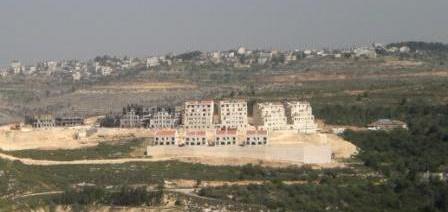 Should Israel’s premiere environment preservation group support settlement activities?
Should Israel’s premiere environment preservation group support settlement activities?
Regarded as one of, if not the, most respected environmental NGOs in Israel, the Society for the Protection of Nature in Israel (SPNI) has a lot to be proud of. Perhaps best known for its tours and field schools, it also works on grassroots community initiatives and tough campaigns, counting the defeat of the Safdie Plan to build on the West Jerusalem Hills among its victories. (Green Prophet has previously covered the SPNI’s efforts to fight the disastrous Eden Hills development and educate young people about environmental advocacy.)
But a recent article by Zafrir Rinat published in Ha’aretz (Green beyond the Green Line, too) posed the awkward as to why SPNI’s campaigns appear to stop at the Green Line, Israel’s pre-1967 border: Why don’t they oppose Israeli construction in the West Bank for environmental reasons?
The SPNI claims to be “apolitical”, which is understandable since it has enough on its place fighting ecological battles, instead of political ones.
Nevertheless, the SPNI has field schools in West Bank settlements including Har Gilo and Ofra, one of the first settlements established by the far-right messianic Gush Emunim movement in the 1970s.
The article also noted that the SPNI has been running tours in settlement outposts (communities established without government authorisation and thus illegal under Israeli law, such as the Givaot Olam organic farm we told you about).
“SPNI says the trips are for educational purposes and do not indicate support for illegal activity,” wrote Rinat. “But it’s difficult not to view trips involving visits to wineries or olive presses operating on outposts, which are meant to show visitors how high-quality wine and olive oil are produced, as expressions of support” [my emphasis].
The article has caused something of a stir, prompting former Israeli Environment Minister, Yossi Sarid, as well as board member of the Life and Environment group, Mossi Raz to write a petition to the Society calling on them to announce the following: “Tours and other activities in illegal outposts contradict the policy of the SPNI and are not established in its framework.“
The SPNI is yet to respond officially.
Opposition to building settlements in the West Bank (which Israel has never annexed) is typically political, noting their illegality vis a vis international law, being a key obstacle in the path of a genuine Israeli-Palestinian peace accord and, if they are not dismantled eventually, eroding the Jewish and democratic character of the State of Israel.
But there are also good environmental reasons to oppose such construction – for example the dumping of rubble and polluted water by the (frankly damn ugly) settlement city of Beitar Illit south of Jerusalem on the agricultural land of the adjacent Palestinian village of Wadi Fukin.
Not exactly “Love Thy Neighbour.”
Other settlements appear designed to take up as much open space as possible, from sprawling cities like Ma’ale Adumim to outposts on the Nablus Hills, rather than building upwards as is the general trend in Israel proper (i.e. west of the Green Line).
Whatever the SPNI’s reasons for staying out of the bitter conflict over construction in the West Bank, the blatant contradiction between claims of being “apolitical” and working in places like Ofra sticks out like a sore thumb. The time has come for them to moving their field schools back to Israel and continue their important work here. Either that, or change the party line please.
More environment news beyond the Green Line:
:: Haaretz, Green Beyond the Green Line, Too
:: Walla, SPNI Encourages Tours to Outposts (Hebrew)
:: Petition to the SPNI by Sarid, Raz et al. (Hebrew)
:: Organic and Illegal: Israeli Farms in the West Bank




Green groups are entitled to follow whichever political agenda they like. But there’s more than a shade of hypocrisy in claiming to be ‘apolitical’, on the one hand, and lending explicit support to highly controversial political projects such as settlements, on the other.
By the way, I read that the SPNI have since discontinued their tours of ‘wineries’ and the like at unauthorized West Bank settlement outposts.
Michael seems to be making the case that environmental organizations must follow a social-liberal-leftist agenda on non-environmental issues.
I argue that the environmental agenda should be kept separate from other issues in order to gain broad based support; protect the evironment and “agree to disagree” on other topics.
Michael’s logic is faulty: SPNI is supporting the destruction of the environment because they have field schools in Ofra and Har Gilo and tours wineries; a completely separate (and ugly!) settlement (Betar Ilit) is dumping rubble on Palestinian land; settlements sprawl while Israel Proper builds upward.
This chain of logic fails to make the case the the SPNI is a supporter of all of the environmental ills in the West Bank. The field schools in Ofra and Har Gilo date back to my childhood – which was a very different time. If the SPNI pulls out based on political considerations, then it will be involving itself in the dispute.
Taking this logic a step further, the SPNI (and all of us) could be accused of supporting the occupation by living in Israel, and therefore, in order to be environmentally responsible we should all leave the country.
Also see my post on ‘Reevaluating “Green” Parties in Israel’ for more on this issue of agendas for environmental organizations:
http://greenprophet.com/2008/11/12/4131/reevaluating-green-partyisrael/
The SPNI is a quasi governmental organization. They can stay apolitical in Israel, but why in the world would they get involved in West Bank issues? Supporting terror is not a sustainable endeavor and counter-intuitive to sound and forward-thinking environmental practises.
In my view, the SPNI can still be proud.